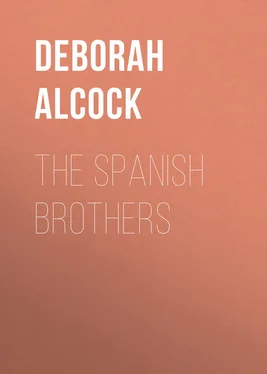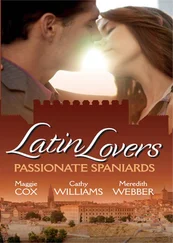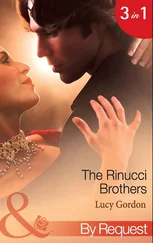Deborah Alcock - The Spanish Brothers
Здесь есть возможность читать онлайн «Deborah Alcock - The Spanish Brothers» — ознакомительный отрывок электронной книги совершенно бесплатно, а после прочтения отрывка купить полную версию. В некоторых случаях можно слушать аудио, скачать через торрент в формате fb2 и присутствует краткое содержание. Жанр: foreign_antique, foreign_prose, foreign_language, на английском языке. Описание произведения, (предисловие) а так же отзывы посетителей доступны на портале библиотеки ЛибКат.
- Название:The Spanish Brothers
- Автор:
- Жанр:
- Год:неизвестен
- ISBN:нет данных
- Рейтинг книги:4 / 5. Голосов: 1
-
Избранное:Добавить в избранное
- Отзывы:
-
Ваша оценка:
- 80
- 1
- 2
- 3
- 4
- 5
The Spanish Brothers: краткое содержание, описание и аннотация
Предлагаем к чтению аннотацию, описание, краткое содержание или предисловие (зависит от того, что написал сам автор книги «The Spanish Brothers»). Если вы не нашли необходимую информацию о книге — напишите в комментариях, мы постараемся отыскать её.
The Spanish Brothers — читать онлайн ознакомительный отрывок
Ниже представлен текст книги, разбитый по страницам. Система сохранения места последней прочитанной страницы, позволяет с удобством читать онлайн бесплатно книгу «The Spanish Brothers», без необходимости каждый раз заново искать на чём Вы остановились. Поставьте закладку, и сможете в любой момент перейти на страницу, на которой закончили чтение.
Интервал:
Закладка:
Had Carlos been a plain soldier, like the brother he was tempted to betray, it is possible he might have come forth from this terrible conflict still holding fast his honour and his brotherly affection. It was his priestly training that turned the scale. He had been taught that simple truth between man and man was a thing of little consequence. He had been taught the art of making a hundred clever, plausible excuses for whatever he saw best to do. He had been taught, in short, every species of sophistry by which, to the eyes of others, and to his own also, wrong might be made to seem right, and black to appear the purest white.
His subtle imagination forged in the fire of his kindled passions chains of reasoning in which no skill could detect a flaw. Juan had never loved as he did; Juan would not care; probably by this time he had forgotten Doña Beatriz. "Besides," the tempter whispered furtively within him, "he might never return at all; he might die in battle." But Carlos was not yet sunk so low as to give ear for a single instant to this wicked whisper; though certainly he could not henceforth look for his brother's return with the joy with which he had been wont to anticipate that event. But, in any case, Beatriz herself should be the judge between them. And he told himself that he knew (how did he know it?) that Beatriz preferred him . Then it would be only right and kind to prepare Juan for an inevitable disappointment. This he could easily do. Letters, carefully written, might gradually suggest to his brother that Beatriz had other views; and he knew Juan's pride and his fiery temper well enough to calculate that if his jealousy were once aroused, these would soon accomplish the rest.
Ere we, who have been taught from our cradles to "speak the truth from the heart," turn with loathing from the wiles of Carlos Alvarez, we ought to remember that he was a Spaniard – one of a nation whose genius and passion is for intrigue. He was also a Spaniard of the sixteenth century; but, above all, he was a Spanish Catholic, educated for the priesthood.
The ability with which he laid his plans, and the enjoyment which its exercise gave him, served in itself to blind him to the treachery and ingratitude upon which those plans were founded.
He sought an interview with Fray Constantino, and implored from him a letter of recommendation to the imperial recluse at San Yuste, whose chaplain and personal favourite the canon-magistral had been. But that eloquent preacher, though warm-hearted and generous to a fault, hesitated to grant the request. He represented to Carlos that His Imperial Majesty did not choose his retreat to be invaded by applicants for favours, and that the journey to San Yuste would therefore be, in all probability, worse than useless. Carlos answered that he had fully weighed the difficulties of the case; but that if the line of conduct he adopted seemed peculiar, his circumstances were so also. He believed that his father (who died before his birth) had enjoyed the special regard of His Imperial Majesty, and he hoped that, for his sake, he might now be willing to show him some kindness. At all events, he was sure of an introduction to his presence through his mayor-domo, Don Luis Quixada, lord of Villagarçia, who was a friend of their house. What he desired to obtain, through the kindness of His Imperial Majesty, was a Latin secretaryship, or some similar office, at the court of the new king, where his knowledge of Latin, and the talents he hoped he possessed, might stand him in good stead, and enable him to support, though with modesty, the station to which his birth entitled him. For, although already a licentiate of theology, and with good prospects in the Church, he did not wish to take orders, as he had thoughts of marrying.
Fray Constantino felt a sympathy with the young man; and perhaps the rather because, if report speaks true, he had once been himself in a somewhat similar position. So he compromised matters by giving him a general letter of recommendation, in which he spoke of his talents and his blameless manners as warmly as he could, from the experience of the nine or ten months during which he had been acquainted with him. And although the attention paid by Carlos to his instructions had been slight, and of late almost perfunctory, his great natural intelligence had enabled him to stand his ground more creditably than many far more diligent students. The Fray's letter Carlos thankfully added to the numerous laudatory epistles from the doctors and professors of Alcala that he already had in his possession.
All these he enclosed in a cedar box, which he carefully locked, and consigned in its turn to a travelling portmanteau, along with a fair stock of wearing apparel, sufficiently rich in material to suit his rank, but modest in colour and fashion. He then informed his uncle that before he took Orders it would be necessary for him, in his brother's absence, to take a journey to their little estate, and set its concerns in order.
His uncle, suspecting nothing, approved his plan, and insisted on providing him with the attendance of an armed guard to Nuera, whither he really intended to go in the first instance.
VII.
The Desengaño
"And I should evermore be vexed with thee
In vacant robe, or hanging ornament,
Or ghostly foot-fall lingering on the stair."
The journey from the city of oranges to the green slopes of the Sierra Morena ought to have been a delightful one to Don Carlos Alvarez. It was certainly bright with hope. He scarcely harboured a doubt of the ultimate success of his plans, and the consequent attainment of all his wishes. Already he seemed to feel the soft hand of Doña Beatriz in his, and to stand by her side before the high altar of the great Cathedral.
And yet, as days passed on, the brightness within grew fainter, and an acknowledged shadow, ever deepening, began to take its place. At last he drew near his home, and rode through the little grove of cork-trees where he and Juan had played as children. When last they were there together the autumn winds were strewing the leaves, all dim and discoloured, about their paths. Now he looked through the fresh green foliage at the deep intense blue of the summer sky. But, though scarcely more than twenty, he felt at that moment old and worn, and wished back the time of his boyish sports with his brother. Never again could he feel quite happy with Juan.
Soon, however, his sorrowful fancies were put to flight by the joyous greeting of the hounds, who rushed with much clamour from the castle-yard to welcome him. There they were, all of them – Pedro, Zina, Pepe, Grullo, Butron – it was Juan who had named them, every one. And there, at the gate, stood Diego and Dolores, ready to give him joyful welcome. Throwing himself from his horse, he shook hands with these faithful old retainers, and answered their kindly but respectful inquiries both for himself and Señor Don Juan. Then, having caressed the dogs, inquired for each of the under-servants by name, and given orders for the due entertainment of his guard, he passed on slowly into the great deserted hall.
His arrival being unexpected, he merely surrendered his travelling cloak into the hands of Diego, and sat down to wait patiently while the servants, always dilatory, prepared for him suitable accommodation. Dolores soon appeared with a flask of wine and some bread and grapes; but this was only a merienda , or slight afternoon luncheon, which she laid before her young master until she could make ready a supper fit for him to partake of. Carlos spent half an hour listening to her tidings of the household and the village, and felt sorry when she quitted the room and left him to his own reflections.
Every object on which his eyes rested reminded him of his brother. There hung the cross-bow with which, in old days, Juan had made such vigorous war on the rooks and the sparrows. There lay the foils and the canes with which they had so often fenced and played; Juan, in his unquestioned superiority, usually so patient with the younger brother's timidity and awkwardness. And upon that bench he had carved, with a hunting-knife, his name in full, adding the title that had expired with his father, "Conde de Nuera."
Читать дальшеИнтервал:
Закладка:
Похожие книги на «The Spanish Brothers»
Представляем Вашему вниманию похожие книги на «The Spanish Brothers» списком для выбора. Мы отобрали схожую по названию и смыслу литературу в надежде предоставить читателям больше вариантов отыскать новые, интересные, ещё непрочитанные произведения.
Обсуждение, отзывы о книге «The Spanish Brothers» и просто собственные мнения читателей. Оставьте ваши комментарии, напишите, что Вы думаете о произведении, его смысле или главных героях. Укажите что конкретно понравилось, а что нет, и почему Вы так считаете.












